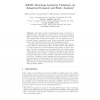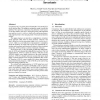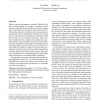17 search results - page 2 / 4 » Hardware atomicity for reliable software speculation |
FASE
2009
Springer
13 years 11 months ago
2009
Springer
Abstract. The reality of multi-core hardware has made concurrent programs pervasive. Unfortunately, writing correct concurrent programs is difficult. Atomicity violation, which is ...
ISCA
2009
IEEE
13 years 11 months ago
2009
IEEE
The advent of multicores has introduced new challenges for programmers to provide increased performance and software reliability. There has been significant interest in technique...
ISCA
1999
IEEE
13 years 9 months ago
1999
IEEE
Sequential consistency (SC) is the simplest programming interface for shared-memory systems but imposes program order among all memory operations, possibly precluding high perform...
ASPLOS
2006
ACM
13 years 10 months ago
2006
ACM
Concurrency bugs are among the most difficult to test and diagnose of all software bugs. The multicore technology trend worsens this problem. Most previous concurrency bug detect...
EUROSYS
2010
ACM
14 years 1 months ago
2010
ACM
Bugs in concurrent programs are extremely difficult to find and fix during testing. In this paper, we propose Kivati, which can efficiently detect and prevent atomicity violat...



